A Child’s Fear of School: Everything You Need to Know About Scolionophobia
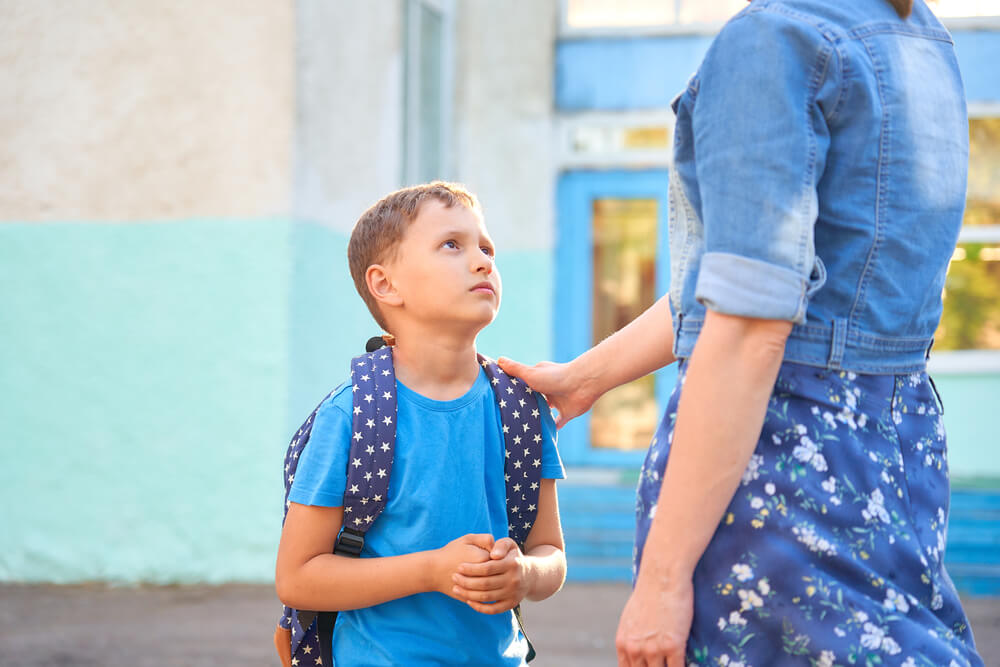
Did you know that a child can develop a fear of school, officially known as Scolionophobia?
It’s true—and no, we’re not talking about a child’s normal reaction to avoiding class because they don’t want to take a test.
According to the Cleveland Clinic, Scolionophobia affects approximately 2%–5% of children. That’s 1 in 20!
Fear of school is most commonly seen in younger and middle-school-aged children, mostly during times of transition, like when a child moves or enters a new school.
So how can parents tell the difference between a child who just doesn’t want to attend class and a genuinely afraid one? How can a parent spot the signs and symptoms of Scolionophobia, and when should a child seek treatment?
Keep reading to learn everything you need to know about a child’s fear of schools and Scolionophobia.
Contents:
- What is Fear Of School?
- Why Your Child is Scared to Go to School: Causes of Scolionophobia
- What are the Symptoms of Scholionophobia?
- Scolionophobia: A Real Phobia or a Child’s Trick?
- How is Scolionophobia Diagnosed
- How Can My Child Overcome a Fear of School?
- When to Ask for Help?
- How is Scolionophobia Treated?
- Overcoming School Phobia
- FAQs
What is Fear Of School?
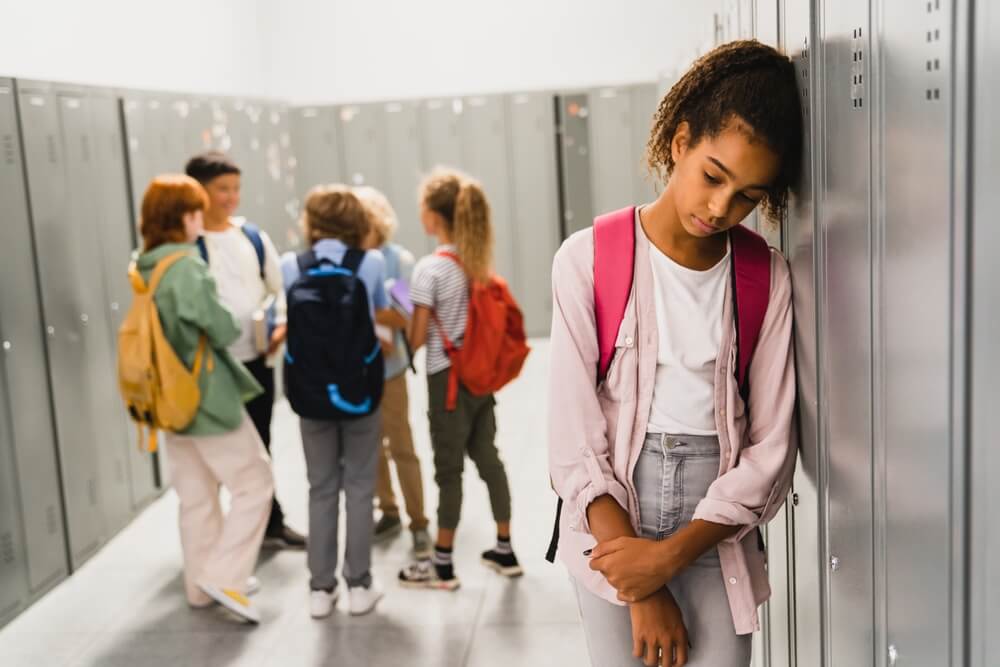
Inside Creative House/Shutterstock.com
Here’s the definition of Scolionophobia:
Scolionophobia (also known as Didaskaleinophobia) is a phobia of going to school, an intense fear of school, or a refusal to go to school that a child feels over a long period of time.
Children with Scolionophobia may become physically ill but often feel incredibly anxious or insecure about attending class. They might also miss a large number of school days for unknown reasons.
Scolionophobia isn’t a clinical diagnosis. However, many medical professionals believe there’s a connection between this phobia and anxiety disorders like panic disorders, separation anxiety, and other generalized anxiety disorders.
Why Your Child is Scared to Go to School: Causes of Scolionophobia
Children can offer many reasons for not wanting to go to school. For children with Scholionophobia, fear is caused by something deeper than a strict teacher or bullies on the bus.
Children 4 to 6

Ann in the uk/Shutterstock.com
This phobia is generally caused by or linked to separation anxiety for this age group. If a child recently experienced their parent’s divorce, they might be afraid that they’ll never see their mother again if they go to school.
Young children who experience more significant trauma, like the death of a loved one, can also reinforce this disorder. Children in this situation might recreate the fear response over and over again in their minds to try and protect themselves from experiencing any further trauma.
Children experiencing separation anxiety will not want to leave their parents to attend school for the majority of the day. While they do not have the ability to clearly express their feelings, these children may complain about physical illness, such as an upset stomach, to avoid going to school.
Children 13 to 15
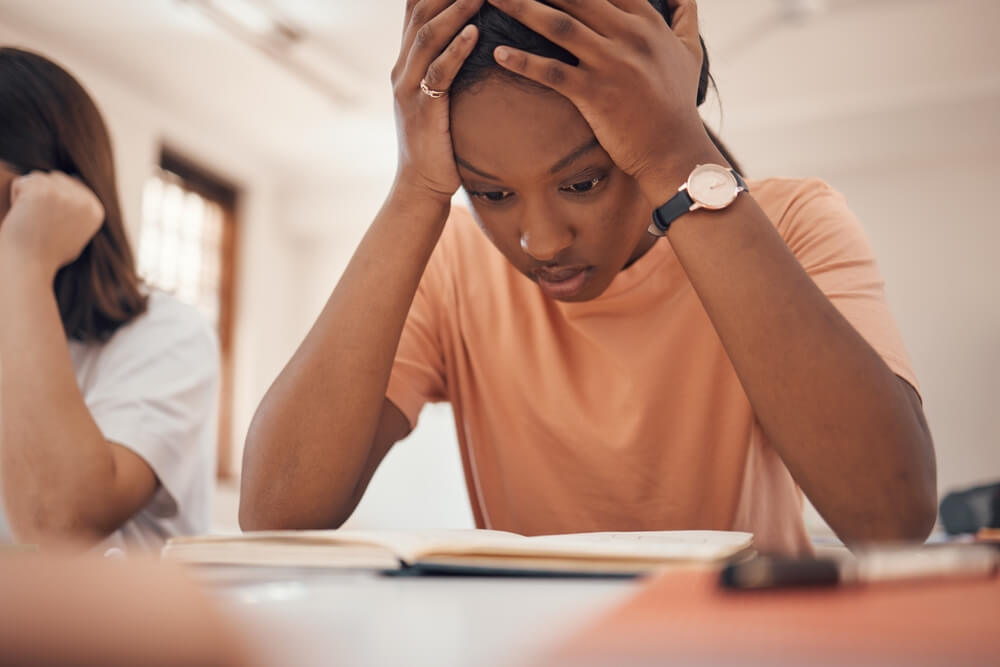
PeopleImages.com – Yuri A/Shutterstock.com
As the intensity of learning in school increases, middle-school children often feel pressure. Dealing with complex subjects like science and math can challenge their academic performance and make them feel inadequate if they find the subjects difficult to understand. This can lead them to avoid going to school so they do not experience criticism or the feeling of being perceived as unintelligent.
These children also begin to experience changes in their bodies associated with puberty, which can make them feel awkward around their classmates. During this time, especially in middle and high school, social pressure is at an all-time high, as is the presence of bullies. Teens who are uncomfortable around their peers at school could end up avoiding going to class. Raging hormones combined with more significant challenges can cause a child to develop a fear of school or going to school.
Unfortunately, unsafe school environments can impact children in middle school. When other children bring weapons or violently bully others, it can trigger Scholionophobia in middle-school children.
More potential factors contributing to school avoidance:
- Separation Anxiety: For younger children, leaving the comfort and security of home to attend school can trigger separation anxiety. This fear of being away from parents or caregivers can lead to resistance or distress.
- Social Pressures and Bullying: The school environment can sometimes expose children to social pressures and bullying, leading to feelings of isolation and fear.
- Academic Stress: High expectations and academic pressure can evoke fear of failure or inadequacy, especially in subjects that a child may find challenging.
- Peer Relationships: Struggles with making friends or navigating social interactions can make school a daunting place, causing social anxiety.
- Unresolved Trauma: Past traumatic experiences, whether related to school or not, can influence a child’s perception of school as an unsafe or anxiety-inducing environment.
- Learning Differences: Children with learning disabilities or difficulties may feel overwhelmed in a classroom setting, leading to avoidance.
- Change or Transition: As we already mentioned, major life changes, such as transitioning to a new school or grade, can trigger anxiety as children adapt to unfamiliar surroundings.
- Negative Associations: Previous negative experiences at school, such as conflicts or bullying with teachers or peers, can contribute to ongoing fear.
It’s essential to communicate openly with your child, listen to their concerns, and collaborate with teachers and school counselors to create a supportive and nurturing environment. By addressing the underlying causes of school avoidance, you can help your child develop coping strategies and gradually overcome their fear of going to school.
Use the Findmykids app with GPS locating and Sound Around features to find out how your child feels at school and on the way to it.
What are the Symptoms of Scholionophobia?
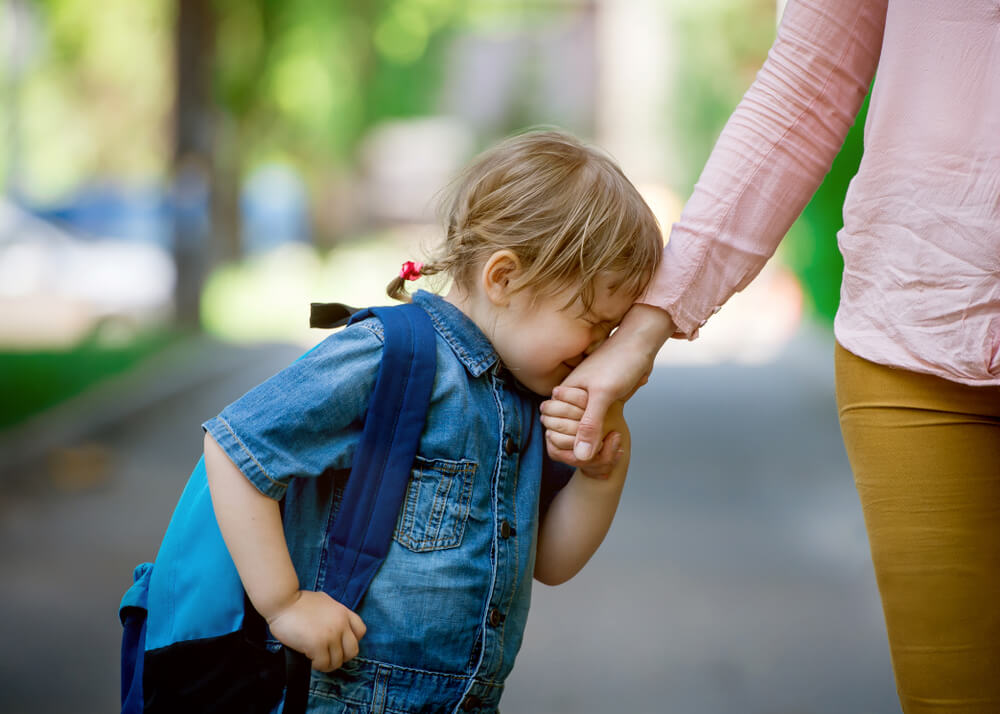
Sharomka/Shutterstock.com
Children display symptoms of Scolionophobia in emotional or physical outbursts, including:
Anxiety
Young children who don’t quite have the language skills to tell their parents about their fear of going to school will often experience anxiety symptoms at the idea of going to school. Symptoms of anxiety could also be displayed when a child pretends to be sick or cries all night.
Panic Attacks
Schoionophobia can also be a panic attack in children, which displays physical symptoms like heart palpitations, nausea, dry mouth, dizziness, and excessive sweating. These panic attacks can come on while your child is getting ready for school, waiting for the bus, entering school, or during class.
Constant Thoughts About Death or Dying
Some children become consumed by the thought of someone they love dying while they’re at school. They become very attached to a parent, sibling, or friend to the point where they follow that person everywhere.
Depression
Older children, like teenagers or teens diagnosed with depression, can also exhibit symptoms of Scolionophobia. In this situation, avoidance behaviors like fake illnesses and made-up excuses can indicate an underlying fear of school.
Parents may also notice social withdrawal and social isolation in teens who suffer from depression. Teens will likely keep to themselves, stay in their rooms, and lose interest in things that once excited them when suffering from depression.
Other Phobias and Disorders
Other common symptoms of fearing school in children can be seen in different behaviors, such as developing irrational fears. For example, a child can become afraid of the dark, being left alone, or even monsters and ghosts. These fears can lead to Scolionophobia.
If parents see some signs and symptoms of Scolionophobia, speaking to a medical professional or healthcare provider is crucial. Fear of school is often a disorder that develops from severe anxiety or other trauma and must be addressed.
Scolionophobia: A Real Phobia or a Child’s Trick?
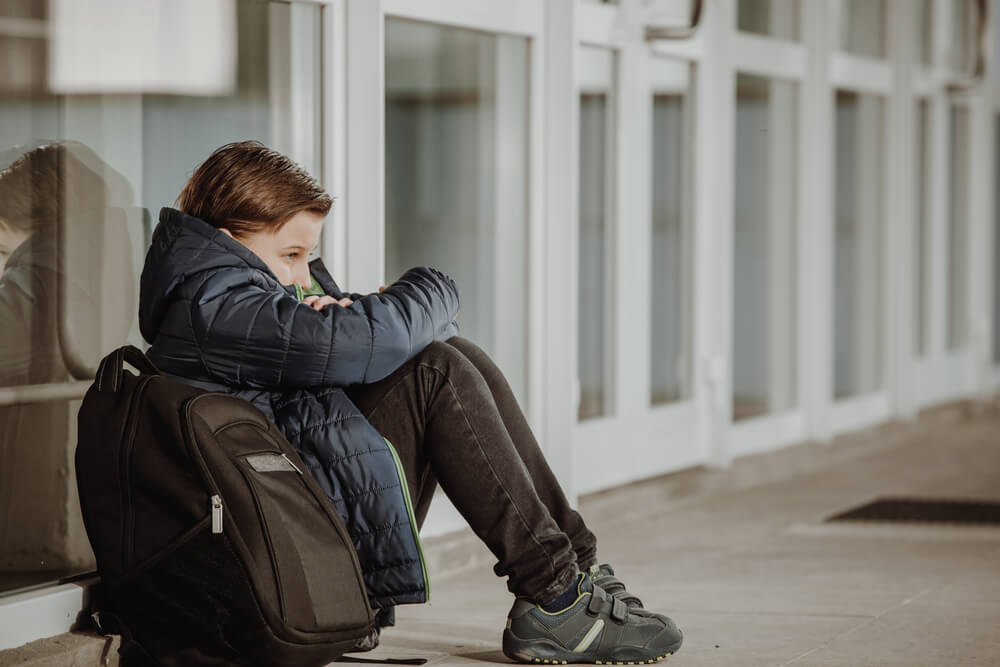
Simon Kadula/Shutterstock.com
It’s a classic student trick to try and get out of school by making up an illness. For some children, going to school is something they want to avoid because they’re being bullied, have difficulty understanding school assignments, didn’t study for a test that day, or are having difficulty adjusting to a new environment.
In most situations, children learn to adapt to these challenges. Parents and schools can provide support to help the child feel better about attending school.
However, for children with Scolionophobia, it’s not just an intense dislike of school. When children with this phobia think of going to school, the result is an intense emotional response to school. Even though Scholionophobia isn’t a clinical diagnosis, it’s a phobia that many children can develop if they have other mental disorders like general anxiety disorder or social anxiety disorder.
So if a child who says they feel ill starts exhibiting signs of social anxiety or panic attacks or throws a tantrum about homework or tests that seems extreme, it couldn’t hurt to look a little closer at whether the child is simply attempting to trick parents into letting them stay home from school or if they’re genuinely afraid to go to school.
Here’s a great ABC news segment that further explores Scholionophobia:
How is Scolionophobia Diagnosed
According to the American Psychiatric Association, a medical healthcare professional can only diagnose a phobia when the fear of something is so persistent and intense that it disrupts a person’s ability to function and quality of life.
A child can only receive a diagnosis of Scolionophobia if their anxiety about school can’t be explained through another mental health, physical, or substance use disorder. This is why diagnosing anxiety, stress, or other disorders in children is more commonly diagnosed than Scolionophobia
Despite this, a genuine fear of school isn’t something parents should ignore. The only way to better understand a child’s fears is to take them to a medical professional who specializes in mental health issues and who can properly evaluate the child based on the following:
- The symptoms the child experiences
- When the symptoms appear
- Whether specific interactions or events trigger symptoms
- How long do the symptoms last
- What helps the symptoms dissipate
- The effect on the child’s quality of life
How Can My Child Overcome a Fear of School?
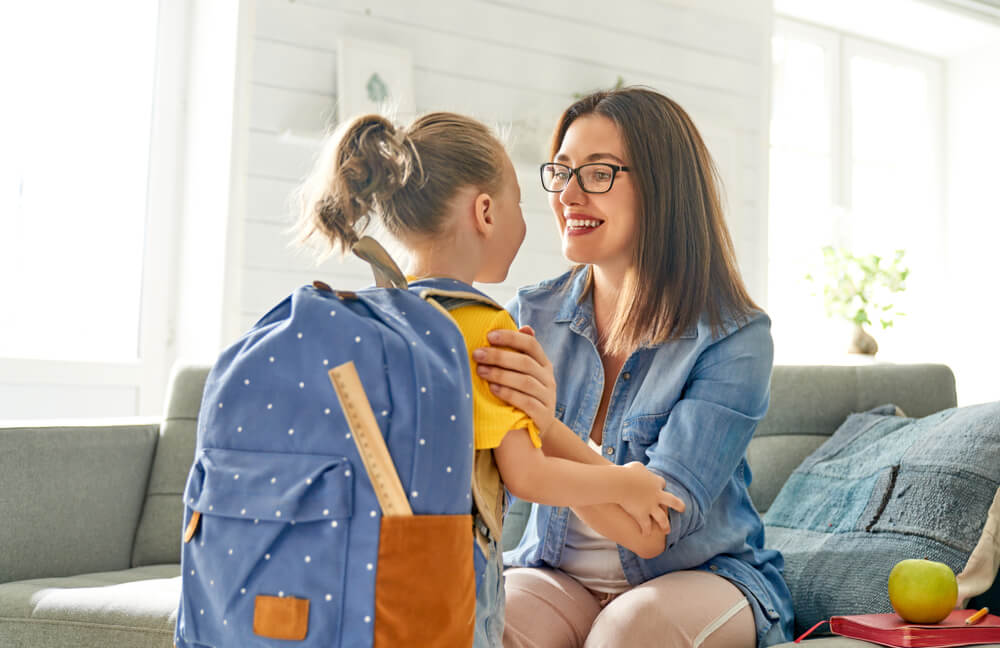
Yuganov Konstantin/Shutterstock.com
Providing formal treatment like therapy or relaxation techniques is the best way to help a child overcome a fear of school over time.
To supplement or help support a child going through formal treatment, parents can help children develop coping strategies. Strategies include,
- Breathing exercises
- Meditation and mindfulness
- Affirmations (positive statements)
All the above strategies help children to decrease stress and anxiety and learn how to manage their emotions better. As a result, many children overcome their fear of school.
Have you tried the Findmykids app? It is a parental control app that can help your child feel safe when going to school. Knowing that a parent can keep track of where they are or even respond to an SOS call can make them feel more at ease, especially when experiencing separation anxiety, and be part of how a child overcomes their fear of school.
Here are some additional practical pieces of advice to help parents address their child’s fear of going to school:
- Role-Playing: Engage in pretend play scenarios at home where your child gets to be the teacher or the confident student. This can help them feel more in control and less anxious about school situations.
- Positive Visualization: Encourage your child to imagine themselves having a successful and enjoyable day at school. Visualizing positive outcomes can help reduce anxiety.
- Small Goals: Break down the school day into manageable segments and set achievable goals. Celebrate each accomplishment, no matter how small, to boost your child’s confidence.
- Transitional Objects: Allow your child to bring a comfort item from home to school, such as a small toy or a family photo, to provide emotional support during the day.
- Lunchbox Notes: Slip a heartfelt note or a small surprise into your child’s lunchbox to remind them that you’re thinking of them throughout the day.
- Buddy System: Arrange for your child to have a “buddy” at school, such as a friendly classmate or a teacher, whom they can turn to for support.
- Visit the School: Arrange visits to the school during non-school hours to familiarize your child with the environment. This can help reduce the fear of the unknown.
- Practice Problem-Solving: Discuss potential challenges your child might face at school and brainstorm together on how to handle them. This can give them a sense of preparedness.
- Establish a Relaxation Routine: Teach your child relaxation techniques, such as progressive muscle relaxation or simple yoga stretches, to help them calm their nerves.
- Create a Safe Space: Designate a specific spot at home as a safe space where your child can unwind and share their thoughts and feelings after school.
- Encourage Self-Advocacy: Teach your child to express their needs and concerns to teachers or school staff, empowering them to seek help when necessary.
- Use Positive Affirmations: Help your child create positive affirmations to repeat when they feel anxious. Phrases like “I am brave” or “I can handle this” can be empowering.
- Plan Reward Systems: Set up a reward system for positive reinforcement where your child earns small treats or privileges for attending school without excessive anxiety.
- Connect with Peers: Arrange playdates with classmates outside of school hours to strengthen social connections and build a sense of belonging.
- Encourage Journaling: Provide a journal for your child to write or draw about their school experiences, allowing them to process their emotions.
- Relaxation Techniques: Introduce meditation and breathing exercises for your child to practice when they are feeling overwhelmed by their fear or school anxiety.
Remember, consistency and patience are key when implementing these strategies. It’s important to create a supportive environment where your child feels understood and encouraged to overcome their fear of school gradually.
When to Ask for Help?
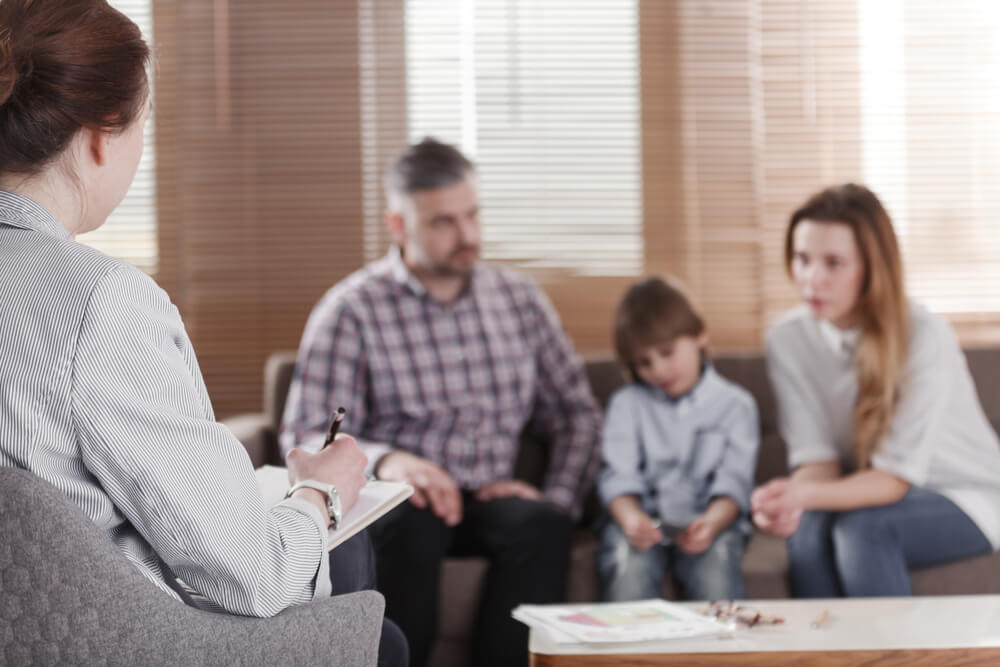
Ground Picture/Shutterstock.com
It can be tricky to know when a child needs help dealing with a phobia like Scolionophobia (fear of school or even a phobia of teachers) to ask for help.
Here are a few tips to help parents know when to ask for help:
- Talk to teachers and other caregivers about expected behaviors and whether the child is meeting expectations.
- If the child asks for help or expresses their fears about school in a way that seems unusual.
- If a child seems to react strongly to going to school (panic attacks, excessive sweating, crying all night, etc.), talk to them. Try to determine the source of their fear.
- Self-help isn’t working, and the anxiety or stress is getting worse.
- If the child is already diagnosed with another disorder, such as anxiety or depression, and begins to exhibit symptoms of Scolionophobia.
One thing to remember is that the earlier you can diagnose a child with a phobia, the better it is for the health and success of that child. When in doubt, seek professional help.
How is Scolionophobia Treated?
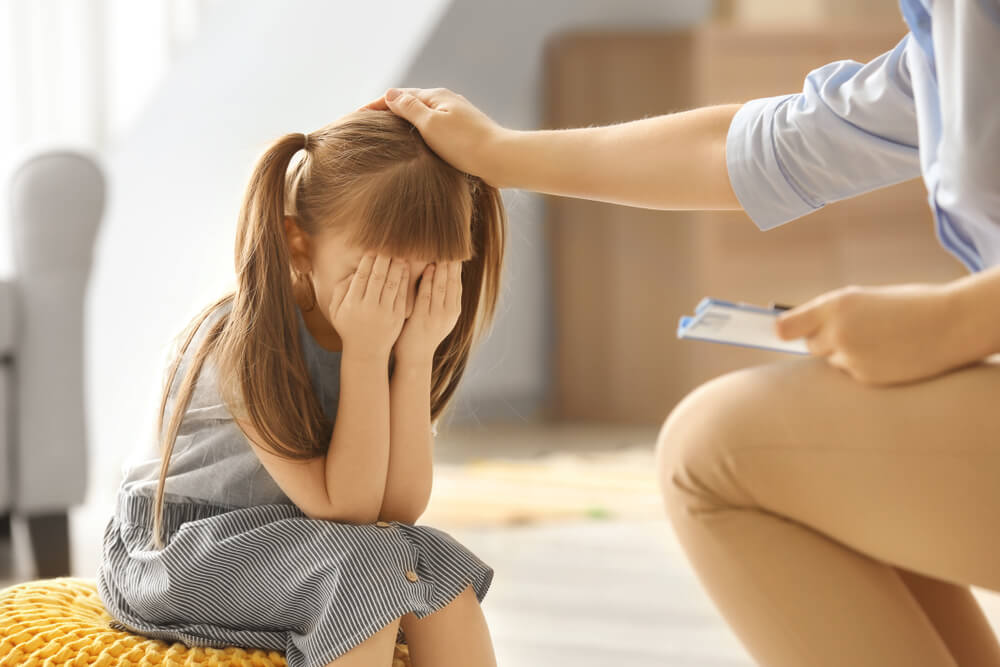
Africa Studio/Shutterstock.com
Depending on the severity of the child’s Scolionophobia, their symptoms may benefit from working closely with a teacher, caregiver, guidance counselor, or mental healthcare professional. It may also benefit the child to take advantage of several other treatments, including:
- Medication: Some children take medication to help with other conditions. For example, a child taking antidepressants might benefit from switching to one that also helps treat anxiety.
- Talk Therapy: Most often known as Cognitive Behavioral Therapy (CBT), talk therapy helps children identify untrue and unhelpful thoughts and replace them with rational ones.
- Exposure Therapy: Slowly exposing a child to their fear (a little at a time) often helps to make going to school less scary. This treatment usually starts by visualizing positive interactions before attempting to enter the environment physically.
- Dialectical Behavior Therapy (DBT): This treatment helps children understand how thoughts can sometimes influence behaviors. Changing how a child thinks about school will allow them to feel less afraid and want to attend class.
- Family Therapy: Attending family therapy sessions where all family members can discuss the child’s fear of school and find effective solutions with a therapist for home and school can be helpful.
When dealing with mental health disorders, it’s crucial to listen to the advice of a medical professional. It’s not healthy or wise to self-diagnose a child or offer them medication without first speaking with a licensed medical professional who can help.
Overcoming School Phobia
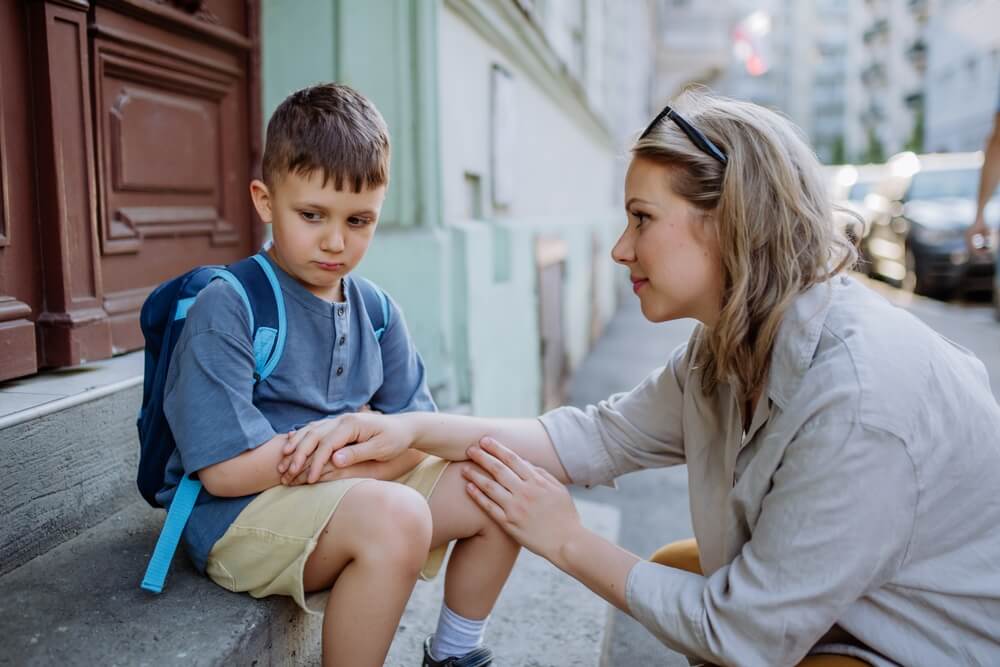
Halfpoint/Shutterstock.com
Not all children will develop a phobia, but for the ones that do, parents need to take action.
Most children with a fear of school live with existing anxiety disorders or even depression. Addressing the real issue with a medical professional is the best way to help a child and get them the treatment they need to overcome this phobia.
Helping a child receive a proper diagnosis can help turn around their feelings about school, leading many to return to class eventually. Providing a child with the right tools like talk therapy, meditation, a parental control app like Findmykids, and exposure therapy can help them overcome their fear of school.
What do you think? What symptoms of Scolionophobia have you seen or experienced? How would you help your child, and what resources would you use? Let us know in the comments!
FAQs
What is Scolionophobia?
Scolionophobia is a mental health condition and avoidance behavior where children experience an intense fear of school. This fear of school can negatively impact the child’s academic performance and social development. It is often linked with symptoms of depression and anxiety in children.
Does Scolionophobia run in families?
Scolionophobia is not linked to genetics, meaning it does not run in families. However, social anxiety may be genetic, according to studies.
Symptoms of social anxiety are commonly found in children who suffer from scolionophobia.
How rare is Scolionophobia?
Scolionophobia is not as rare as you may imagine. It is present in 1 in 20 children, or 2% to 5%.
What are the triggers for Scolionophobia?
Common triggers for Scolionophobia include bullying, academic pressure, threats or physical harm from peers, punishments from teachers, and criticism or ridicule of their academic performance or behavior from authoritative figures.
The picture on the front page: Alexander_Safonov/Shutterstock.com
Проверьте электронный ящик



















